IOS Lecture on ‘Islam and Knowledge: Al-Faruqi’s Concept of Religion in Islamic Thought’
January 25, 2020 at Institute Building, 162, Jogabai, Jamia Nagar, New Delhi
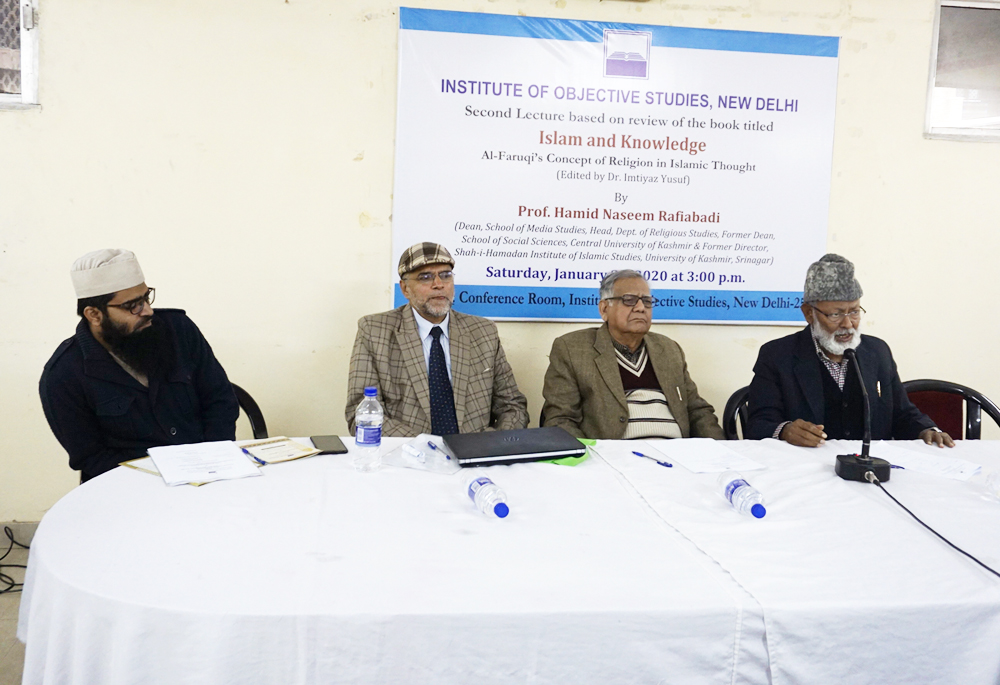
The second lecture based on review of the book, ‘Islam and knowledge: Al-Faruqi’s concept of Religion in Islamic Thought’ (edited by Dr. Imtiyaz Yusuf), was organised by the Institute of Objective Studies here at its conference hall on January 25, 2020. Prof. Hamid Naseem Rafiabadi, dean, School of Media Studies, Department of Religious Studies, former dean, school of Social Sciences, Central University Kashmir and ex-director, Shah-i-Hamdan Institute of Islamic Studies, University of Kashmir, Srinagar, delivered a lecture on the topic.
He said that the volume was based on articles, memoirs and intellectual assessment of the monumental work of Ismail Raji al-Faruqi. In this volume, he noted, the articles and memoirs had been written mostly by those who had a close association with Raji al-Faruqi.
These included John L Esposito, Khurshid Ahmad, Seyyed Hossein Nasr, Anwar Ibrahim, John Raines, Richard C Martin, Gerard S Sloyan, Muddathir Abd al-Rahim, James Zogby, Imtiyaz Yusuf, Anis Ahmad, Yushan Sodiq, Abul Fadl Mohsin Ebrahim, Charles Fletcher, Md. Salleh Yaapar, Aminah Beverly McCloud, Ibrahim M. Zein, Gisela Webb, Kamar Qinah Kamaruzaman, and Vivienne SM Angles, who had either close acquaintance with Faruqi or were his students, he added.
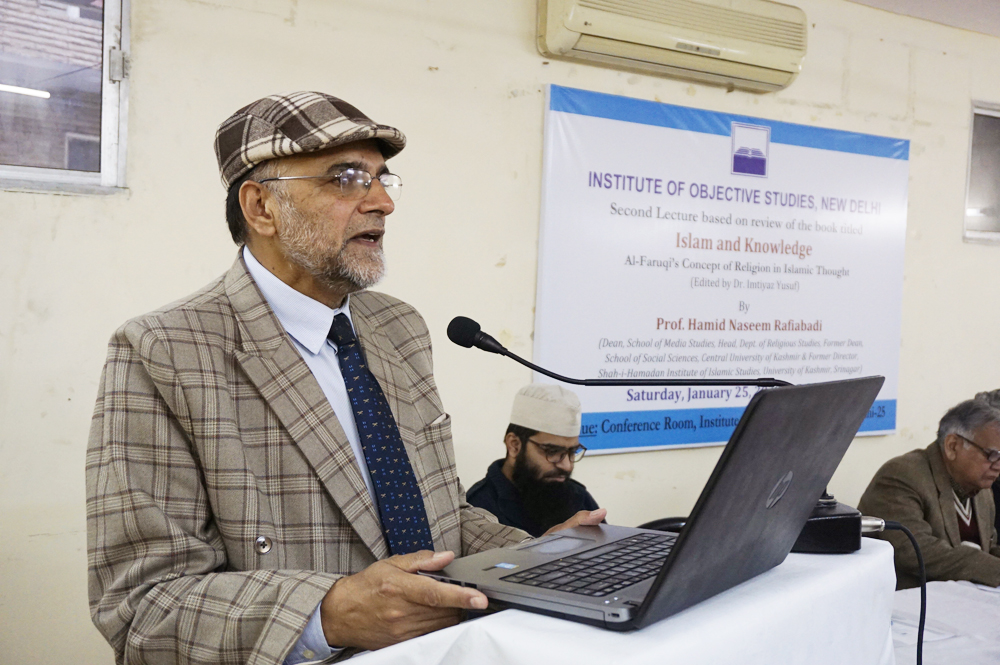
Prof. Rafiabadi held that al-Faruqi was a great scholar who had a profound understanding of modern developments on the intellectual landscape of the world. Though he belonged to Palestine, he never accepted their viewpoint. He also never accepted the view of his adversaries, most of whom were biased against Muslims. He believed that there was a conspiracy of Western scholars to defame Muslims and Islam. That was the reason he tried to synthesise Islam by explaining the concept of Tawhid (Oneness of God). He was of the firm opinion that both Christianity and Judaism contributed to Tawhid. Raji al-Faruqi had a global approach to Islam and combined nationalism with universal humanism.
Prof. Rafiabadi said that he was like Dr Mohammad Iqbal who had a vision akin to his. Instead of relying on Greek philosophy as did most Western scholars, he based his premises on the Quran and Hadith. Prof. Raji al-Faruqi strongly believed that for being a true scholar, one had to be a faithful intellectual. Minds were formed by educational policies. Another major contribution of al-Faruqi in the field of knowledge was its decolonisation. Like Edward Said, he was critical of Western scholars who did not give weightage to Islamic thought, he said.
Prof. Rafiabadi said al-Faruqi went to the US to teach Americans ethical monism. He stressed the need for a new kind of dialogue. This was an inter-faith dialogue to dispel misconceptions about Islam. His stay in the US gave him an opportunity to challenge noted Western scholars’ views on Islam, particularly the Western concept of Shi’ism and Sufism. Prof. al-Faruqi strongly defended Sufism and said that it was very much part of Islam. This exposed the hidden agenda of Western scholars. Prof. Edward Said also held the same opinion. He said that his depth of knowledge encompassed religions like Christianity, Hinduism and Chinese thought. His study of world religions led him to write a book on the subject.
He also wrote a book on Christianity and explored the possibility of religions coming together for the greater good of the world. His erudition attracted a number of Western scholars to engage with him. Prof. Rafiabadi said that all prophets from Adam onwards were Muslims and this proved that Islam was in existence from the very beginning of human life on earth. He observed that Islam did not disclaim the good things in life. He seriously studied Christianity and came to the conclusion that English terms used in Islamic discourse did not properly correspond to the text and context. Keeping this in view, he wrote a book called ‘Towards Islamic English’.
Prof. Rafiabadi referred to his prediction that the animosity against Islam would one day become so strong that many states would unite to attack Muslims. This spectacle had become a reality, though not always discernible in several parts of the world. Prof. al-Faruqi spent some time in Pakistan to prepare a curriculum on Islamic thought, but fell to a conspiracy by his critics leading to his departure from the country. He said that a project on Islam launched by Prof. al-Faruqi was gaining momentum. He was conscious of the sanctity of written language and vouched for disciplined scholarship. Recognised by great scholars of the world, he invigorated Muslims to play an active role in the life of the US. He made an impassioned plea for inter-faith dialogue for better understanding of the core of different religions. Fully imbued with the knowledge of the Quran and Hadith, he commanded respect among well-known scholars of the world. Prof. Rafiabadi remarked that Prof. al-Faruqi’s ideas found resonance among several Indian scholars of Islamic thought. Prof. al-Faruqi was concerned about the malaise in the Muslim society and thought of presenting Islam to the world in a better way. In his works he talked of Tawhid and the traditions of Muslim history. He said that Prof. al-Faruqi was a great mind and to understand a great mind, great minds were required. No knowledge, except that of the Quran and Hadith, was eternal, he concluded.
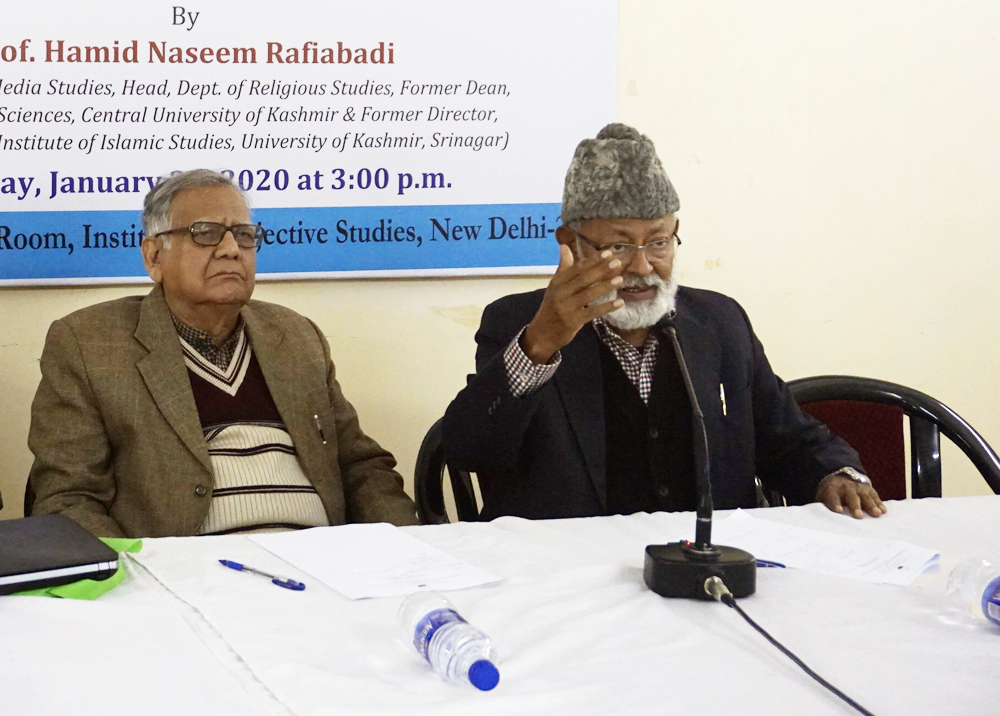
The chairman of IOS, Dr. Mohammad Manzoor Alam, pointed out that knowledge was not static. It continued to be in a flux. It was only knowledge that could cope with the challenges of every sort. Thus seeking knowledge was imperative for the younger generation to keep itself better prepared for meeting the challenges of today and tomorrow. Explaining the purpose of Creation, he said that it was aimed at the spread of knowledge. Referring to Islamisation of knowledge, he observed that names of several scholars could be listed in this connection. Two universities, one each in Nigeria and Malaysia, were busy preparing curriculum for Islamic thought. He said that Prof. Raji al-Faruqi did in the US what Dr. Mohammad Hamidullah did in France for the study of the Quran and Hadith. He complained that scholars today talked of research methodology, but did not refer to Islamic research methodology. He also laid stress on the need for an alternative research methodology.
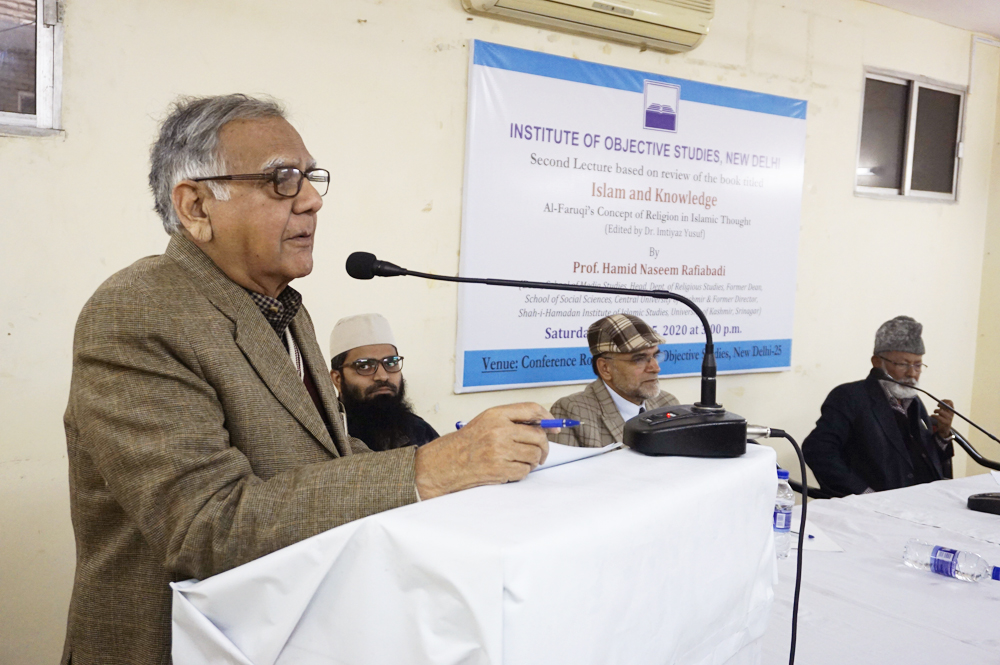
Presiding over the programme, the secretary general of IOS, Prof. ZM Khan, observed that this was the second lecture on the theme “religion and religious thought.” He said that Prof. al-Faruqi must be understood from the point of view of a scholar as also from the prism of relevance and requirements of our times. Besides explaining the epistemological perspective of Islam, he thought that it was more relevant than anything. He presented sound logic for the unity of knowledge. He also left behind a lesson on how we could solve the problems of the human species, Prof. Khan said.
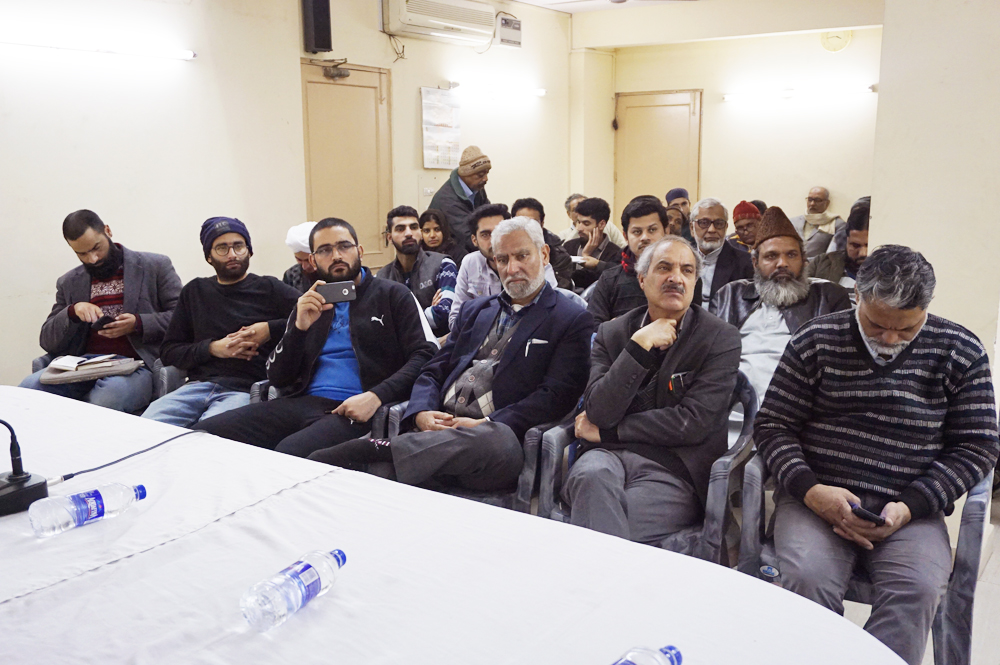
Earlier, the lecture began with recitation of a verse from the holy Quran by Hafiz Athar Husain Nadwi. This was followed by the introduction of the subject by Maulana Shah Ajmal Farooq Nadwi, in-charge, Urdu section of the Institute. The lecture ended with a question-answer session and a vote of thanks by him. The lecture drew a good number of scholars, university teachers, research scholars and prominent citizens.
Go Back